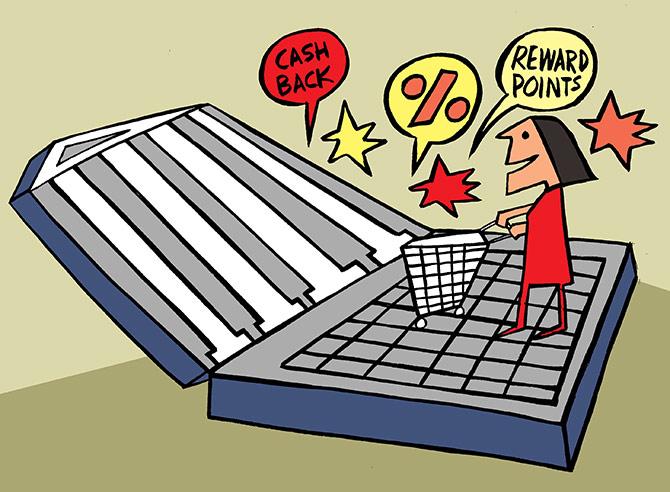Private labels remain big business for e-commerce marketplaces. They comprise almost 15 per cent of the total business of such firms.
Illustration: Uttam Ghosh/Rediff.com

An aggressive push by e-commerce majors over the new year weekend to force the government into a parley seems to have paid off, with the latter on Thursday clarifying there are no restrictions on private labels being sold by e-marketplaces.
The sharp reversal of policy by the Department of Industrial Policy & Promotion (DIPP) comes barely a week after the government had explicitly restricted such sales and is the latest development in an intense ongoing debate on e-commerce rules.
“An entity having equity participation by e-commerce marketplace entity or its group companies, or having control on its inventory by e-commerce marketplace entity or its group companies, will not be permitted to sell its products on the platform run by such marketplace entity,” the DIPP’s press note 2 (2018) said recently.
Part of a set of new guidelines for foreign direct investment (FDI) in e-commerce, the order had tightened the regulatory screws on the sector by also barring flash sales, deep discounts, and mandated annual norm compliance submissions to the Reserve Bank of India.
This had the effect of bringing together the two largest e-marketplaces, Amazon India and Flipkart.
These two companies currently have 30 private labels covering 200 different categories.
They have together spent $1.5 billion in the country to expand their private labels, and have major expansion plans.
A senior functionary from one of these majors argued that they were staring at huge losses as significant capital has already been spent on infrastructure, staff, and marketing.
The climbdown
Sources in the know said delegations from these and other companies had continuously sought appointments with DIPP officials and were also planning to approach Commerce and Industry Minister Suresh Prabhu.
Thursday’s official clarification by the DIPP came after this. “Concerns have been raised that press note 2 (2018) prohibits sale of private label products through the marketplace.
"It is clarified that the present policy does not impose any restriction on the nature of products which can be sold on the marketplace,” the DIPP said on Thursday.
Taking the help of industry bodies, Confederation of Indian Industry and Federation of Indian Chambers of Commerce & Industry, e-commerce firms, along with investment giants such as SoftBank, Tiger Global, Sequoia, and Naspers, are pushing to have a dialogue with the government soon, it is learnt.
The parties may meet on January 11 with the Internet and Mobile Association of India taking the lead in discussions.
A senior DIPP official refused to comment on what precipitated Thursday’s contradictory clarification, but assured that the clarification remains the final legal stand of the government, as of now, on the private label business.
Private labels remain big business for e-commerce marketplaces. They comprise almost 15 per cent of the total business of such firms.
Over the past year, these companies have been expanding their operations in this space.
The Kalyan Krishnamurthy-run Flipkart has been bullish on growth of its six private labels comprising 160 categories and is planning to concentrate more on sales of its private label brands in 2019.
It claims to have seen a 550 per cent rise in the sales of its private labels in the festive season.
“Physical retailers also have private labels. It is a legitimate business practice. There is no reason to single out e-commerce firms.
"It is not a publicly held firm, so they have every right to have a run with their business plans. Let the Competition Commission of India look into any issues, if there are any,” said Arvind Singhal, chairman, Technopak Advisors.
Going forward
The move has elicited severe criticism from domestic trader bodies.
The Confederation of All India Traders (CAIT) has been particularly livid, after having met the commerce minister earlier in the day and having been assured of a stronger e-commerce policy that favour Indian players.
“The new press note is explicit. E-commerce companies with FDI can’t sell their own goods, which means private labels are not allowed.
"The new clarification note is a simple stupid confusion or losing guts and backtracking,” CAIT National Secretary General Praveen Khandelwal said.










